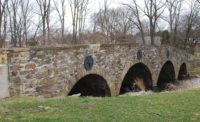Pennsylvania lawmakers are considering a measure to rein in the Pennsylvania Dept. of Transportation’s recently announced plan to use public-private partnerships and new tolls for major bridge reconstruction and rehabilitation projects.
State Senate Bill 382, approved on a party-line vote by the chamber’s Transportation Committee on March 17, with Republicans in the majority, would require Pennsylvania’s Public-Private Transportation Partnership Board to provide public access to analyses for any P3 proposal involving a user fee, and provide a 30-day comment period before voting on the project. The bill also would also require applicable P3 projects to receive concurrent legislative endorsement before going forward.
The Associated Pennsylvania Constructors came out against the plan, arguing that it is risky to rely on tolling to pay for construction projects.
Last November, the state board authorized PennDOT to solicit proposals to design, build, operate and maintain major existing non-tolled interstate bridges around the state under 20- to 30-year concession agreements. Electronic tolling would be implemented on the completed structures to pay for improvements, with any excess revenue applied to other road and bridge projects in the area.
Estimated to generate as much $2.2 billion in construction work, the plan was envisioned to help PennDOT narrow an annual $8.1 billion funding gap for rehabilitation and maintenance projects. Without the P3 initiative, funding for the projects would be pulled from other interstate projects, while maintenance would take up a larger share of district-level transportation budgets, the agency cautioned in a statement.
In February, PennDOT announced that nine bridges were under consideration for the program, having met the criteria for being “of substantial size that warrant timely attention and would require significant funds to rehabilitate or replace,” as well as offer the feasibility of beginning construction within two to four years.
The state’s trucking industry voiced its opposition to the plan, citing the additional financial burden new tolls would place on motor freight operators.
Although PennDOT’s P3 evaluation process is subject to public involvement requirements of state and federal environmental review processes, the bill's lead sponsor, state Sen. Wayne Langerholc, Jr. (R) considers them insufficient.
“At a time when transparency to our constituents is of paramount concern, we must ensure [their] voices are heard, that they are involved in the process, and that the General Assembly is ultimately the one responsible for such decisions in our Commonwealth," he said in a memorandum accompanying the proposed bill.
PennDOT countered that adding new public input requirements that are already part of the agency’s normal review processes would “undercut” and “politicize” a process aimed at fostering innovation and efficiency, according to a statement opposing SB 382. The agency further asserted that the bill would add “unnecessary bureaucracy” that the state’s original P3 legislation was designed to avoid, and it "forces proposed P3 projects to compete with other important issues and priorities for the legislature’s attention and action.”
The full state Senate is scheduled to hold its second vote on SB 382 on March 23, during which amendments to the bill may be offered.
If approved a third time, the bill will then go to the state House of Representatives for consideration. Republicans control both chambers of the Pennsylvania legislature, which will be in session throughout the year.
Projects currently under consideration for PennDOT’s major bridge P3 program include:
- I-78 Lenhartsville Bridge Replacement Project (Berks County)
- I-79 Widening, Bridges and Bridgeville Interchange Reconfiguration (Allegheny County)
- I-80 Canoe Creek Bridges (Clarion County)
- I-80 Nescopeck Creek Bridges (Luzerne County)
- I-80 North Fork Bridges Project (Jefferson County)
- I-80 Over Lehigh River Bridge Project (Luzerne and Carbon counties)
- I-81 Susquehanna Project (Susquehanna County)
- I-83 South Bridge Project (Dauphin County)
- I-95 Girard Point Bridge Improvement Project (Philadelphia County)
In other Pennsylvania construction news, work on the northern section of the Central Susquehanna Valley Thruway in central Pennsylvania has resumed after a winter shutdown. Picking up where it left off in December, Trumbull Corp. completied a 4,545-ft-long, 180-ft-high bridge across the West Branch of the Susquehanna River. Contractors also have begun excavation and embankment work that will allow paving to proceed toward the thruway’s interchange with U.S. 15 near Winfield. Paving work on the east side is also resuming, with the entire northern section set to finish in 2022.
Construction of the Thruway’s southern section, delayed due to the discovery of coal ash ponds within the alignment, is also scheduled to begin next year. The entire 12.4-mile, $865 million project would be done in 2027.
This story was updated with new information on March 26





